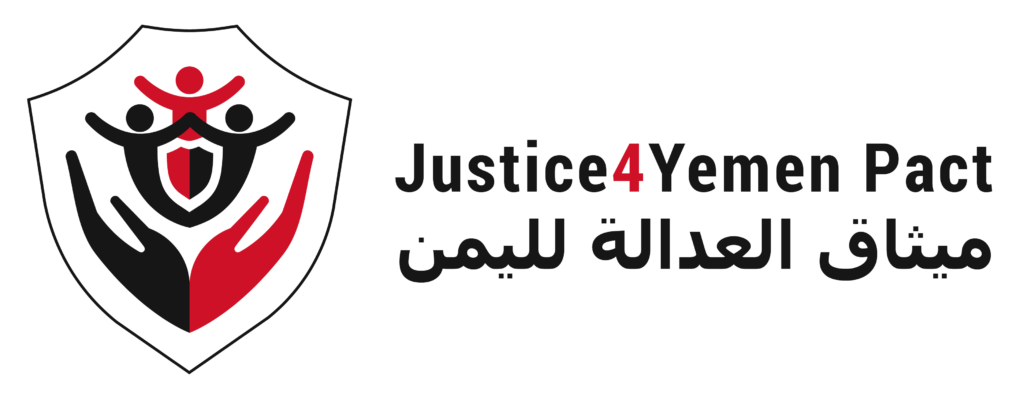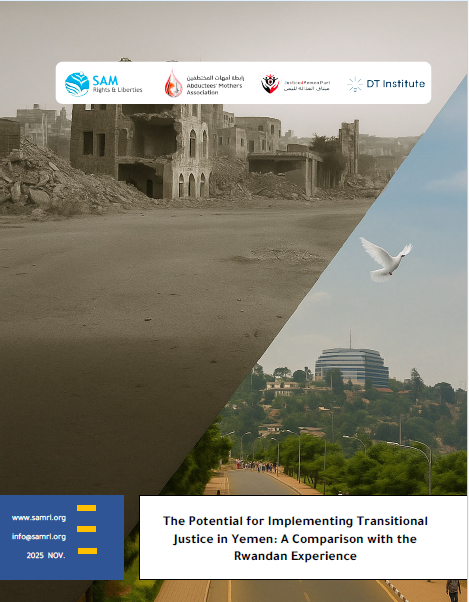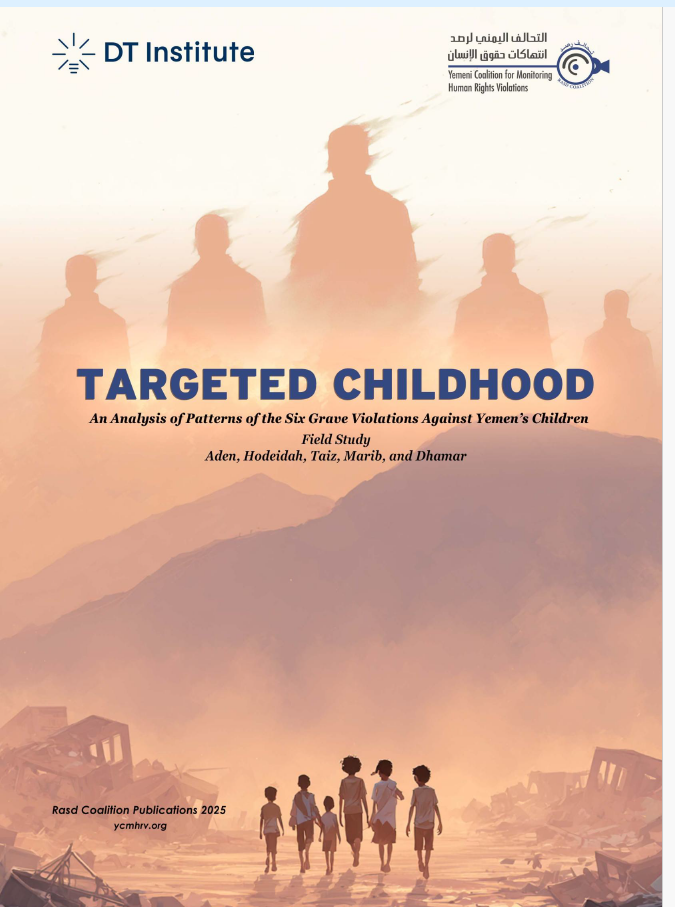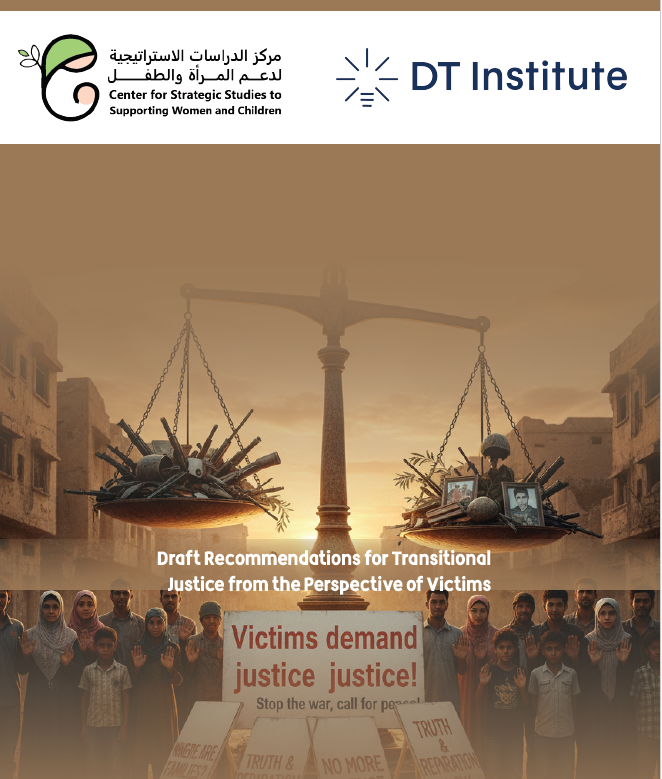Yemen Monitor/ Prepared by Iftikhar Abdu
(This report is part of the “Supporting Peace in Yemen through Accountability, Reconciliation, and Knowledge Sharing” (SPARK) project, implemented by the DT Institute in partnership with two members of the Justice for Yemen Pact Coalition: the Abductees’ Mothers Association and the SAM Organization for Rights and Liberties.)
Over a decade into the conflict in Yemen, the concept of transitional justice has gained increasing prominence, championed by civil society and human rights actors as a key approach to ending cycles of violence and establishing lasting peace. In recent years, numerous initiatives, studies, and publications have explored transitional justice in Yemen, amid rising awareness of the significant challenges the process faces, including structural obstacles as well as political, social, and institutional constraints and opportunities.
Within this context, a new study titled “The Path Ttowards Peace” examines how local communities perceive the prospects and mechanisms for implementing transitional justice and national reconciliation as a foundation for sustainable peace in Yemen.
This study was prepared by the Abductees’ Mothers Association and the SAM Organization for Rights and Liberties, both members of the Justice for Yemen Pact Coalition, with support from the DT Institute, as part of the “Supporting Peace in Yemen through Accountability, Reconciliation, and Knowledge Sharing” (SPARK) project.
The Path Ttowards Peace is a field research study based on 122 individual interviews and 20 focus group sessions, engaging a total of 203 participants across six Yemeni governorates: Sana’a, Aden, Hodeida, Taiz, Hadramout, and Ma’rib. The research was carried out by a team of 13 field researchers and facilitators between November 2024 and February 2025. Using purposive sampling, the team ensured balanced representation across gender, regions, and segments of society affected by the conflict, including victims of violations, internally displaced persons, marginalized groups, and others.
The SPARK Project
Speaking about the “Supporting Peace in Yemen through Accountability, Reconciliation, and Knowledge Sharing” (SPARK) project, Mrs. Amat al-Salam Al-Hajj, Chairwoman of the Abductees’ Mothers Association, explained: “SPARK is a project aimed at promoting national reconciliation, sustainable justice, and broader acceptance of the principles and mechanisms of transitional justice. It also seeks to assess the capacity of Yemeni civil society to implement transitional justice activities. The project is jointly implemented by the Abductees’ Mothers Association, the SAM Organization for Rights and Liberties, and DT Institute.”
Al-Hajj told Yemen Monitor that the project’s objectives include assessing local capacities and perceptions of transitional justice, providing capacity-building programs, piloting local restorative justice initiatives, and convening stakeholders from various parties to exchange knowledge and advocate for international engagement in Yemen’s transitional justice process.
Commenting on the field study The Path Towards Peace, Al-Hajj noted that one of its primary goals is to identify the types of violations experienced by victims and determine appropriate measures for redress. The study also seeks to assess community awareness of transitional justice concepts, survey perceptions of the feasibility and mechanisms of implementing transitional justice and national reconciliation in Yemen, and to evaluate the readiness of civil society to adopt these approaches as tools for building trust across societal divides.
Challenges Encountered During the Study
Speaking about the challenges faced in conducting the study, Mrs. Amat al-Salam Al-Hajj noted that several obstacles emerged during both the preparation and implementation phases. “Among the key challenges were security concerns, which necessitated conducting some interviews and focus group discussions online. Limited financial resources also restricted the research team to six governorates. Additionally, the sensitivity of the topics discussed created hesitation among some participants, affecting their ability to speak openly and transparently.”
Transitional Justice: A National and Humanitarian Necessity
The study showed that 51% of the research sample had no knowledge of transitional justice and no prior background in this area, while 49% had knowledge and understanding of transitional justice. This requires human rights activists and media professionals to intensify their efforts to raise awareness about transitional justice among the general public.
In this regard, Dr. Wahib al-Houri, a researcher in the field of transitional justice, told Yemen Monitor: “There is tireless work in Yemen, particularly in areas under the authority of the recognized government, to establish transitional justice. There are many youth and women’s initiatives that play an effective role in establishing concepts of peace, spreading awareness of transitional justice, practicing local mediation efforts, resolving community conflicts, and mobilizing local communities around advocating for peace and social cohesion. These initiatives are carried out by community committees, elders and sheikhs, the Community Reconciliation and Peace Committee, the Mediation Committee, and the Committee for the Forcibly Disappeared. He added, “Yemeni society still needs more awareness of the concepts of transitional justice, including reparation, accountability, reconciliation, compensation, fairness, and the establishment of sustainable peace.”
Reconciliation or Accountability?
The field study The Path Towards Peace found that 64.3% of participants across both interviews and focus groups expressed a preference for reconciliation and an end to the war, while 35.7% prioritized accountability and justice. Those in favor of reconciliation viewed it as essential for achieving transitional justice, preserving Yemen’s unity under the rule of law, and bringing the conflict to a definitive end.
Conversely, supporters of accountability emphasized the importance of justice in ensuring perpetrators acknowledge their crimes, protecting victims’ rights, and preventing impunity. They also pointed to the reluctance of some parties to engage in national reconciliation, arguing that justice and accountability are necessary conditions for meaningful and lasting peace.
Commenting on this tension, researcher and civil society activist Al-Houri stated: “Reconciliation should come first, while accountability can be delayed until stability is achieved. Although accountability is crucial, it may, if pursued prematurely, undermine transitional justice and stability. Perpetrators, especially those in positions of power, may obstruct or manipulate the justice process.”
He added: “If reconciliation is to succeed in Yemen, it must take precedence, but not at the expense of justice. Those responsible for crimes should not go unpunished, and the rights of the oppressed, including the families of the wounded, the martyrs, and their mothers, must be preserved. A careful balance between reconciliation and accountability is therefore essential.”
The Role of Political Parties in Transitional Justice
Some participants in The Path Towards Peace study expressed skepticism about the involvement of political parties in the transitional justice process, citing concerns about partisanship and the prioritization of political self-interest over national reconciliation.
When experts participating in the study were asked about the appropriate role of political parties in implementing transitional justice mechanisms, most agreed that parties should focus on drafting necessary legislation, supporting national reconciliation initiatives, and facilitating compensation procedures for victims.
Commenting on this issue, Al-Houri observed: “Political parties are taking two paths, one that supports transitional justice, and another that obstructs it. Some parties seek to exploit transitional justice as a façade to conceal the violations they themselves committed. In reality, political parties in Yemen may pose a significant obstacle to genuine transitional justice, as most have held power at some point before shifting into the opposition.”
He further added: “All political parties, without exception, appear as invested in the idea of transitional justice as they are in obscuring facts, erasing the past, and avoiding accountability for human rights violations and crimes committed against the people and the rule of law.”
The Right Time to Implement Transitional Justice
Al-Houri emphasized that the time to begin laying the groundwork for transitional justice in Yemen is now. “Transitional justice must be established in a genuine and transparent manner, and awareness should be raised within society about its significance. Once that foundation is in place, both judicial and non-judicial mechanisms, including prosecution, accountability, and reconciliation, can be pursued.”
He further explained that while preparatory efforts should begin immediately, full implementation should follow the end of the war, regardless of whether peace comes through a political settlement or military resolution: “Transitional justice should not be imposed through ‘victor’s justice,’ but must be grounded in fairness, with its institutions and frameworks developed in advance.”
Al-Houri also stressed the importance of learning from successful international experiences. “Yemen can and must benefit from the transitional justice experiences of countries like Tunisia, Morocco, South Africa, and Rwanda, where transitional justice helped societies heal and became a model for others.”
He concluded: “What Yemen needs is a transitional justice process that serves the people; one that holds all violators of human rights accountable, compensates victims, restores their rights, and repairs the harm that has affected everyone.”
Survivors and Victims at the Core of Transitional Justice
In this context, Journalist and Former Detainee Ibrahim al-Jahdubi, who survived imprisonment in Houthi-run facilities, emphasized the central role of victims in any transitional justice process: “Although the concept of transitional justice remains unclear to large segments of Yemeni society, awareness has gradually increased, particularly among human rights activists, victims, and civil society organizations. Still, this awareness remains limited and often clouded by political and regional polarization.”
Speaking to Yemen Monitor, Al-Jahdubi explained that many Yemenis tend to conflate transitional justice with either criminal accountability or political deals, without fully understanding its broader dimensions; such as truth-telling, reparations, guarantees of non-repetition, and institutional reform. “Because transitional justice is tied to the political context, ongoing instability, continued conflict, and the politicization of justice prevent it from taking root as a comprehensive concept. It must be seen as a path that addresses victims’ aspirations and society’s hope for lasting peace. To achieve this, long-term awareness programs are needed, along with independent institutions capable of translating transitional justice into meaningful and practical steps for Yemenis.”
Accountability is Essential
Al-Jahdubi stressed that accountability and reconciliation are not mutually exclusive but should proceed in a deliberate and complementary sequence: “In Yemen, many victims insist on accountability, not out of a desire for revenge, but to restore dignity, acknowledge suffering, and put an end to impunity, which has only deepened injustices and escalated violence.”
The study explored victims’ key priorities for justice and redress, based on testimonies from participants who reported personal or family experiences of violations. Legal accountability for perpetrators was marked as the top priority by 53.5% of participants, followed by financial compensation (second), then psychological support and rehabilitation ranked third, medical treatment fourth, acknowledgment and apology from the perpetrator fifth, and reconciliation ranked last.
Al-Jahdubi concluded that: “Victims want their voices to be heard. They want what happened to them to be acknowledged, and for perpetrators to be held accountable, or at the very least, for the truth to be revealed. This is not opposed to reconciliation. On the contrary, it is the foundation of meaningful reconciliation. Any reconciliation that lacks truth and accountability is a fragile façade that will only reproduce conflict.”
Balancing Justice and Political Realities
Al-Jahdubi pointed out that while full criminal justice may not be immediately achievable in Yemen’s current context, transitional justice can still take meaningful forms: “From a practical standpoint, the nature of accountability may vary depending on the context. Full criminal justice might not be attainable right away, but it is possible to work toward symbolic justice, compensation, documentation of violations, and guarantees of non-repetition. The key is that reconciliation must not come at the expense of truth or the rights of victims.”
Al-Jahdubi criticized the approach of political actors in Yemen, noting that their engagement with transitional justice is often shaped by short-term interests rather than genuine commitment: “The role of political parties and conflict actors in Yemen is often negative or selective. Most view transitional justice through a pragmatic lens, using it as a tool to serve their immediate agendas rather than as a path to historical justice and the establishment of a state based on law and equal citizenship.”
He further explained that some parties may publicly embrace the language of justice or reconciliation, but only for strategic reasons: “Some parties raise slogans of justice or reconciliation for negotiation purposes or to polish their image in front of the international community, without any sincere intention to make concessions or acknowledge their role in the violations.”
Al-Jahdubi emphasized the urgent need for genuine political will to support a comprehensive and inclusive transitional justice process, one that transcends political bargaining and exclusion: “All parties must demonstrate real political will to engage in a transitional justice process that is inclusive and not subject to power dynamics. They must redefine their roles, not only as political stakeholders, but also as social actors committed to upholding the values of democracy, justice, and the rule of law.”
He concluded by underscoring the crucial role of civil society: “Civil society organizations, especially those representing victims, should play a key role in lobbying, advocacy, and proposing alternative, practical models for transitional justice. These models must be rooted in the realities of Yemen and aimed at building a just and sustainable peace.”
The Southern Local Community’s View of Transitional Justice
Mona Haitham, a political figure affiliated with the Southern Transitional Council, shared insights into how transitional justice is perceived in the southern regions of Yemen. She believes that “the majority of Yemenis are unfamiliar with the concept of transitional justice, often confusing it with tribal reconciliation or general amnesty. This misunderstanding stems from the government’s lack of genuine effort to introduce transitional justice mechanisms into society, and from the philosophy of the conflict parties in power, who treat the transitional phase in Yemen as a matter of power-sharing rather than justice.”
Speaking to Yemen Monitor, Haitham explained that victims often define justice in personal and emotional terms: “Victims think of transitional justice as the return of their children, or at least the opportunity to bury them. They do not demand institutional reform or truth-telling, because they lack faith in institutions altogether. Fear of retaliation also deters many from speaking out, leading them to accept tribal customs as a substitute. As a result, discussions of transitional justice in Yemen are typically led by civil society organizations in Aden, Taiz, or Sana’a, which often approach the issue from an elitist, rights-based perspective.”
Haitham highlighted that in the southern local community, the understanding of transitional justice is deeply shaped by historical grievances, particularly the war of 1994, adding: “Awareness of transitional justice in the south is linked to the harm inflicted by the leadership, army, and tribes from the north during the 1994 war, when unity was imposed by force, violating the principle of voluntary union between two states, as recognized by the United Nations Charter. This awareness also has a temporal dimension, reaching back to the pre-1990 southern political era, before unification.”
She stressed the interconnectedness of justice and reconciliation: “There can be no transitional justice without national reconciliation, and no reconciliation without accountability. Addressing the accumulated harm of the past and present through legal and social mechanisms is essential for moving toward reconciliation and lasting peace.”
Haitham also noted a distinct southern vision for applying transitional justice: “The southern community understands transitional justice within a unique framework, beginning with the adoption of a transitional constitution that explicitly guarantees the right of any region to hold a referendum on secession, under international supervision.”
She concluded by underscoring the political nature of transitional justice and the influential role of political parties: “Transitional justice is not just a legal process, it is, above all, a political one. Political parties can either support or obstruct it. Their positive role begins with political acceptance of the concept, integrating it into their platforms and articulating clear mechanisms for its implementation. This creates the necessary political legitimacy and opens the path toward national consensus.”
She pointed out that: “The political parties in the north are traditional entities with significant political influence, notably the General People’s Congress and the Yemeni Congregation for Reform, Islah party. These parties have been part of the government and the conflict, carrying historical responsibility. The Houthis, as an armed group, have also been actively involved in the war and have committed human rights violations. While there are emerging parties that represent new voices advocating for more independent justice and reconciliation, all northern parties have been implicated in violations and are unlikely to be impartial actors in transitional justice.”
Regarding the south, she noted that: “Political party branches do exist, but they do not play a prominent role in supporting transitional justice and lack popular acceptance among southerners, who often view them as major opponents of the southern cause.”
She further explained: “The Southern Transitional Council (STC) can provide significant support and legitimacy to the implementation of transitional justice. Notably, the STC and major southern factions achieved consensus through dialogue on the drafting of the Southern National Charter, which was signed by 37 southern components on May 8, 2023. This charter outlines general principles for the Southern Transitional Justice Project, although some southern political groups have their own agendas and chose not to sign the document.”
Conclusion
This study has illuminated critical issues warranting further research, such as the stances of political parties and societal groups, and the local community’s clear preference for reconciliation as a means to end a protracted conflict that has exhausted all. At the same time, a substantial portion of victims insist on accountability, underscoring the need for a flexible approach that balances reconciliation with justice.





